|
THE
BLUE ECONOMY
ABOUT -
CONTACTS - FOUNDATION -
HOME - A-Z INDEX
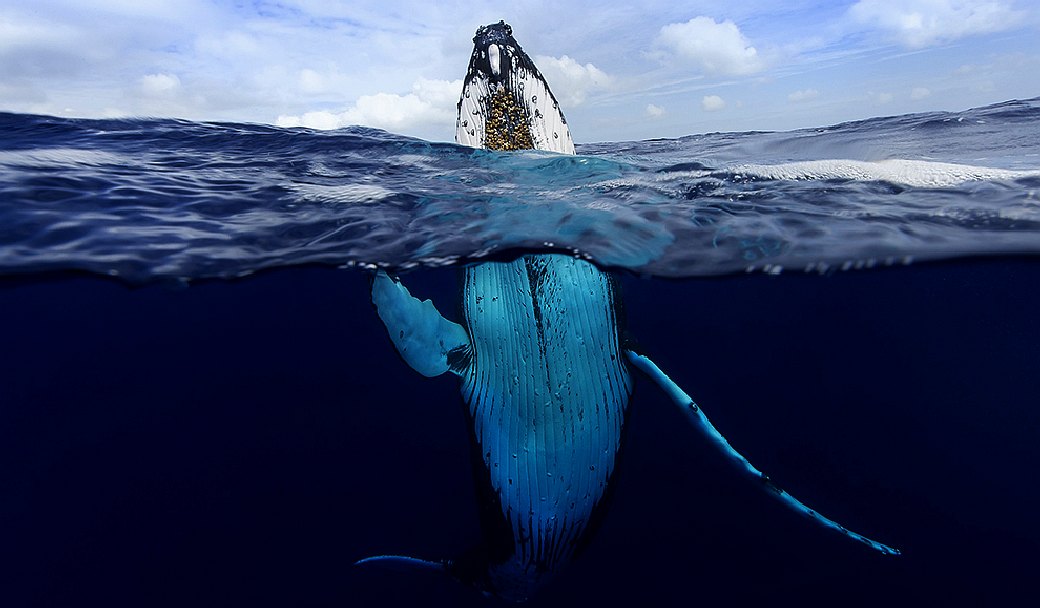
MARINE
LIFE - This humpback whale is one example of a magnificent
animal that is at the mercy of human
activity. Humans are for the most part unaware of the harm their fast-lane
lifestyles are causing to marine life as they work 9-5 in
factories and offices, and shopping for food is just a chore
that they cram into evenings or weekends. We aim to change that by doing all we
can to promote ocean
literacy.
|
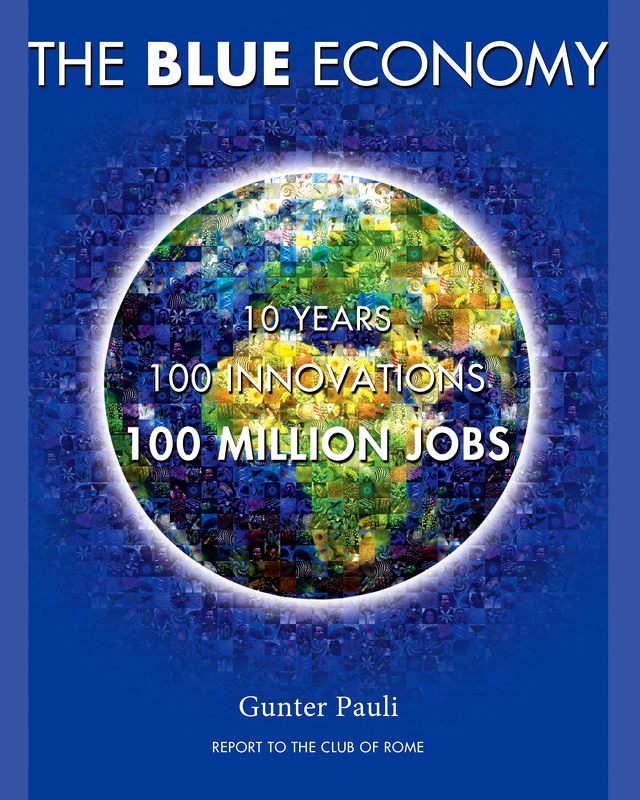
|
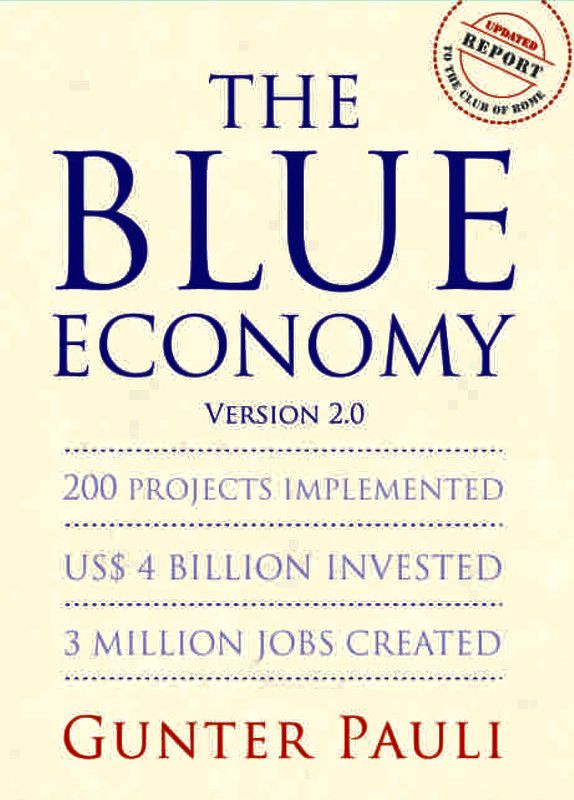
|
|
. |
. |
|
The Blue Economy: 10 years - 100 innovations - 100 million jobs is a book that expresses that a Blue Economy business model will shift society from scarcity to abundance "with what is locally available", by tackling issues that cause environmental and related problems in new ways. The book highlights potential benefits in connecting and combining seemingly disparate environmental problems with open-source scientific solutions based upon physical processes common in the natural world, to create solutions that are both environmentally beneficial and which have financial and wider social benefits. The book suggests that we can alter the way in which we run our industrial processes and tackle resultant environmental problems, refocusing from the use of rare and high-energy cost resources to instead seek solutions based upon simpler and cleaner technologies. The book proposes to focus on the generation of more value, instead of blindly cutting costs. The book aims to inspire entrepreneurs to adopt its insights, by demonstrating ways in which this can create economic benefits via job creation, reduced energy use, and more revenue streams from each step of the process, at the same time benefiting the communities involved. |
The Blue Economy, Version 2.0 explores some of the most tantalizing prospects for realizing a low carbon, resource-efficient, and competitive economy in the 21st century. They largely depend on allowing nature to do the work it does best: innovate, manufacture, use and recycle—over and over, for the longest of times. The book demonstrates that we can find ways of utilizing physics, chemistry, and biology with renewable materials and sustainable practices just as ecosystems do. With appropriate policies to support research and development, with promotional strategies delivered through market mechanisms, these materials and methods offer abundant opportunities for accelerating adaptation to pressing global issues.
V 2.0 describes 200 projects, set up with an investment of 4 billion and created 3 million jobs. It also presents few case studies from the work of Development Alternatives, which is the Indian counterpart of the Zero Emission Research and Initiatives network to demonstrate ways by which science can help society in designing meaningful opportunities for creating livelihoods and also the goods and services that enable ordinary people meet their everyday needs. |
The 'blue' economy represents roughly 5.4 million jobs and generates a gross added value of almost €500 billion a
year in Europe and $27 trillion dollars internationally.
The
“blue
economy” - the concept of an economically and environmentally sustainable ocean-based
economy - has emerged as a new approach to developing and managing ocean resources.
Our economic relationship with the ocean is once again evolving in important ways. As a setting for global trade and commerce, and as a significant source of
food and
energy, the ocean’s contribution is already important. This century, it is likely to become an economic force.
The drivers are many and varied, but have their origins in our growing familiarity with the ocean environment; new technologies that make it feasible and economically viable to tap ocean resources; longer-term growth and demographic trends fuelling; the search for food security and for alternative sources of minerals and energy; seaborne trade and rapid
coastal urbanisation, among others.
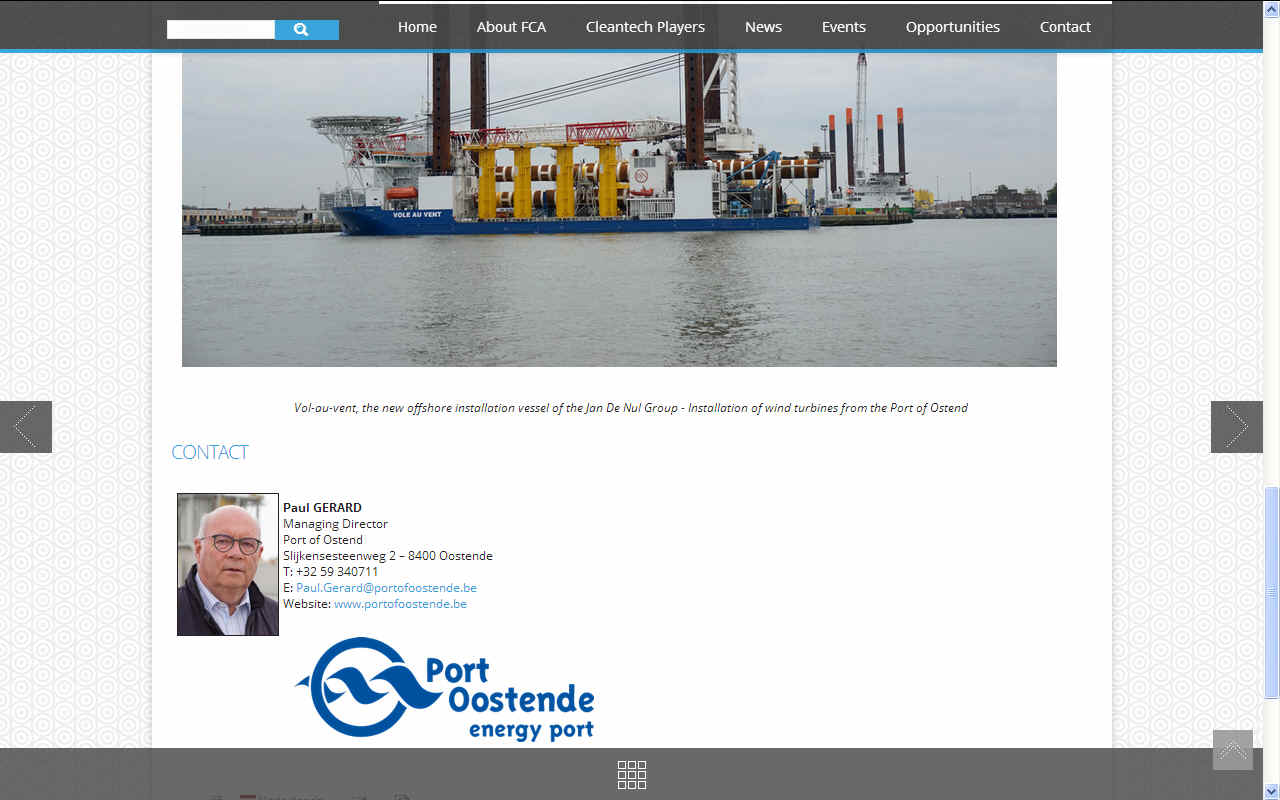
OOSTENDE -
232 Belgian wind turbines in the North Sea make a significant contribution towards Belgium’s achievement of its renewable energy targets. Together, they are responsible for generating enough electricity to supply no fewer than 750,000 families. And more of them are on the way. Ultimately, the aim is to achieve a total of 450 wind turbines with a total capacity of 770 TWh, yielding an annual electricity supply of 8,085 TWh, the equivalent of 9.5% of electricity consumption in Belgium.
To
find out more about installing wind turbines around Belgium
contact:
Paul GERARD
Managing Director
Port of Ostend
Slijkensesteenweg 2 – 8400 Oostende
T: +32 59 340711
E: Paul.Gerard@portofoostende.be
Website: www.portofoostende.be
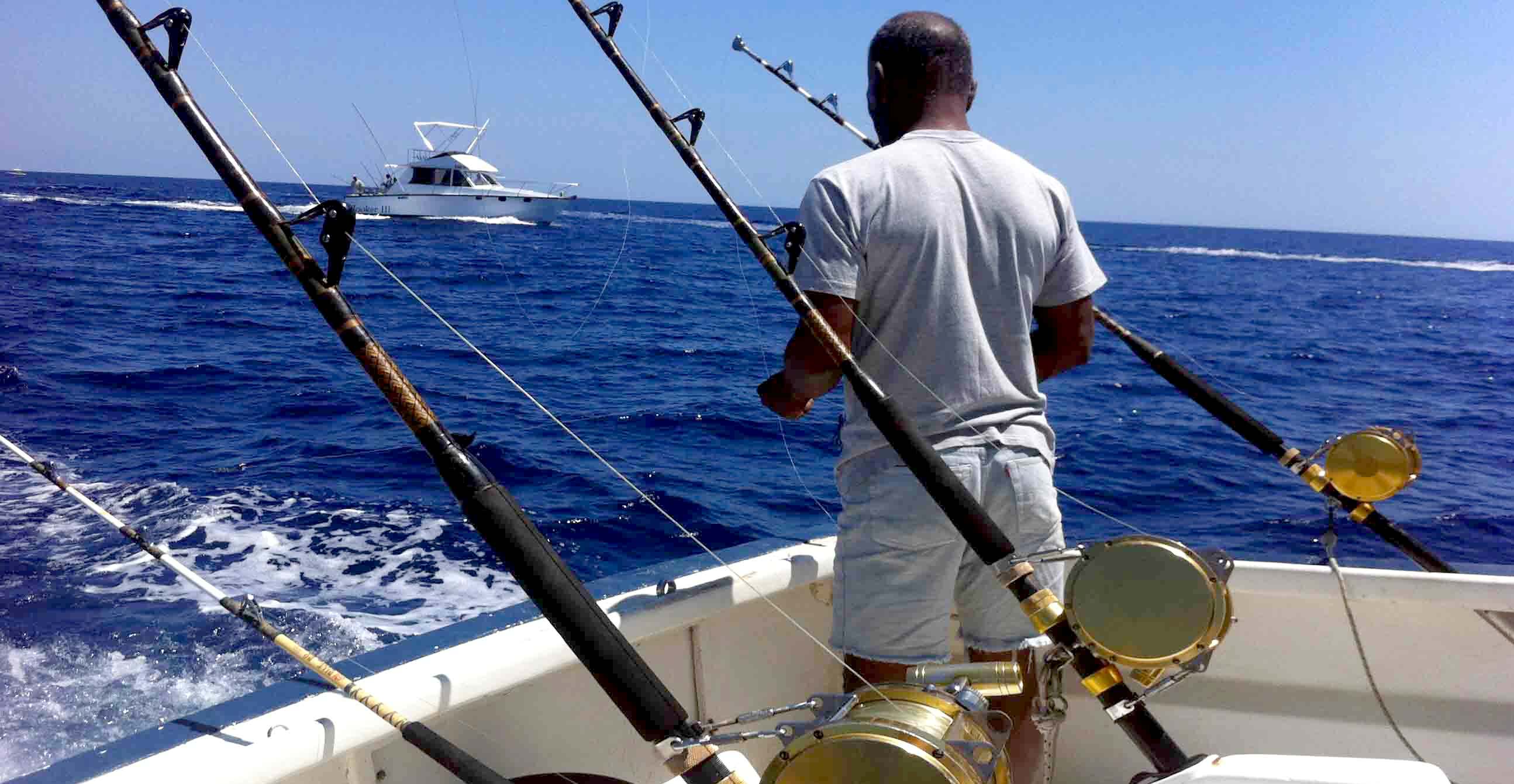
MAURITIUS - The Government Programme 2015 reflects the vision of the Government to transform Mauritius into an ocean state by promoting the ocean economy as one of its main pillars of development. A Ministry of Ocean Economy, Marine Resources, Fisheries, Shipping and Outer Island dedicated to ocean related activities has been created. In addition, the legal and regulatory frameworks to monitor ocean economy operators will be established.
Mauritius has a total maritime zone of 2.3 million square kilometres with an Exclusive Economic Zone of 1.96 million square kilometres and a continental shelf of 396,000 square kilometres co-managed with the Republic of Seychelles.
CONCEPT
TO REALITY
Can the concept of the blue economy be more than aspirational? What do governments, and others, really mean when they refer to it? Is the blue economy at risk from “greenwashing”? What are the challenges of “blueing” the ocean economy? What are the investment opportunities? And what opportunities are there for existing industries facing the transition to more environmentally sustainable practices, or for new and innovative investments, where technologies and business models and innovations are focused on promoting or
restoring ocean
health?
WHAT'S
THE DIFFERENCE BETWEEN THE CIRCULAR ECONOMY AND THE BLUE
ECONOMY ?
The Blue Economy includes the Circular Economy but goes beyond it.
Both are about radical resource productivity, zero waste and sustainability. Both incorporate concepts such as systems thinking and design, cradle-to-cradle, closed loop, up-cycling, reuse, recycling, remanufacturing, industrial ecology, renewable energy, share economy. However the Blue Economy goes further to strengthen competitiveness by lowering costs and pursuing a more effective economy of scale. It's a business model that generates more value and multiple benefits (including social and environmental) with locally available resources.
The Blue Economy shifts away from the core business / core competence that force companies to focus on one industry, by considering local economic development as a priority, ensuring that local purchasing power increases and more money circulates regionally. This enables growth without inflation through an increase in local production of goods and services. The Blue Economy also comes with a core set of over 100 pre-screened innovations that have multiple benefits and multiple applications.
Work is typically done through a Blue Economy cluster, working to identify available local resources and relevant innovations - both from the core, multi-application Blue Economy innovations and from other sources. The design approach is inspired by nature, copying ecosystem design frameworks that aim for everyone to be employed and nothing to be wasted.
A Blue Economy is guided by 23 explicit principles framed by
the originator Gunter Pauli.
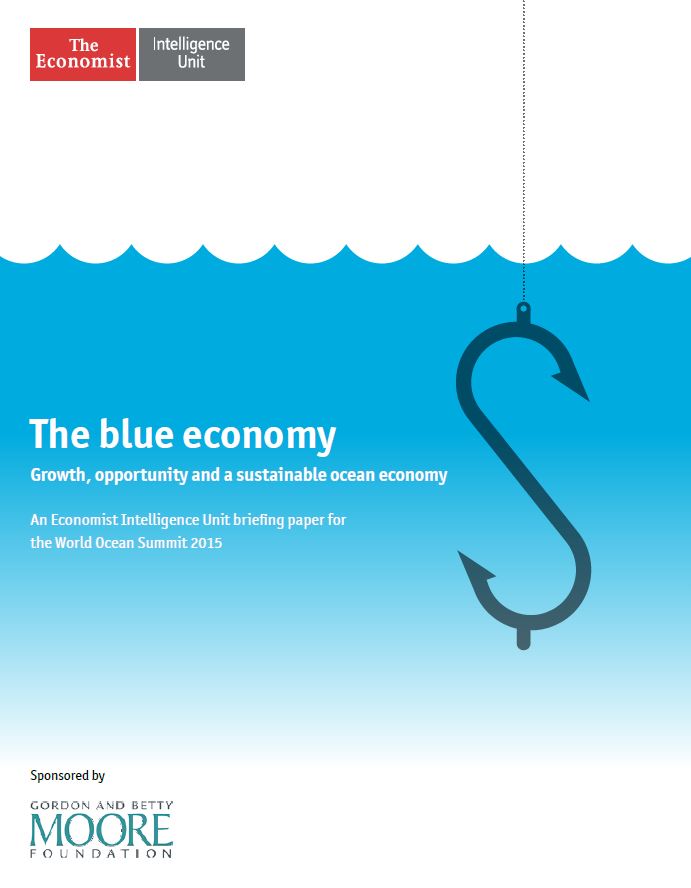
THE
BLUE ECONOMY - A report on the state of the blue economy
produced by The Economist and the Betty Moore Foundation.
THE
ECONOMIST
The Economist Intelligence Unit, sponsored by the Gordon and Betty Moore Foundation,
embarked on a programme of research which draws on interviews with ocean stakeholders and existing research to raise, and
answer as many of these questions as possible.
In the first of the proposed white papers, the “State of the blue economy”,
The Economist and their backers seek to take stock of the blue economy concept today and identify key strategies
for - and impediments
to - advancing the idea of a sustainable ocean economy. Acknowledging the significance of investment to the future of the ocean economy, a second proposed report, “Investing in the blue economy”,
is due to examine how money can be made from a growing ocean economy in a context where environmental considerations and principles of sustainable natural resource management could shape the investment
environment for philanthropic and city investors.
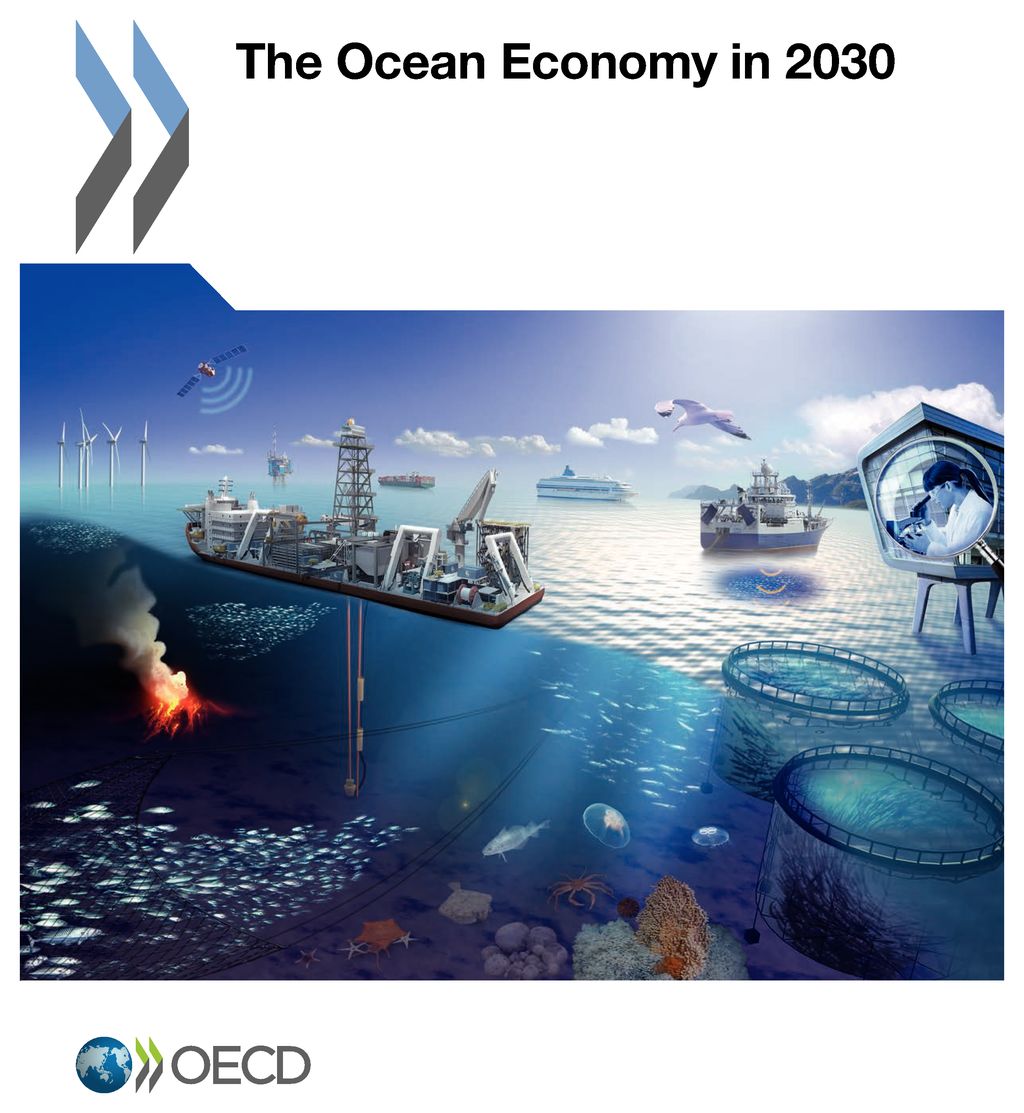
REPORT - This report explores the growth prospects for the ocean economy, its capacity for future employment creation and innovation, and its role in addressing global challenges. Special attention is devoted to the emerging ocean-based industries in light of their high growth and innovation potential, and contribution to addressing challenges such as energy security, environment,
climate change and
food
security.
It examines the risks and uncertainties surrounding the future development of ocean industries, the innovations required in science and technology to support their progress, their potential contribution to green growth and some of the implications for ocean management. Finally, and looking across the future ocean economy as a whole, it explores possible avenues for action that could boost its long-term development prospects while managing the use of the ocean itself in responsible, sustainable ways.
OECD
The mission of the Organisation for Economic Co-operation and Development (OECD) is to promote policies that will improve the economic and social well-being of people around the world.
Calculations based on the OECD’s Ocean Economy Database value the ocean economy’s output (measured in terms of the ocean-based industries’ contribution to economic output and employment) in 2010 at USD 1.5 trillion, or approximately 2.5% of world gross value added (GVA). Offshore oil and gas accounted for one-third of total value added of the ocean based industries, followed by maritime and coastal tourism, maritime equipment and ports. Direct full-time employment in the ocean economy amounted to around 31 million jobs in 2010. The largest employers were industrial capture fisheries with over one-third of the total, and maritime and
coastal tourism with almost one-quarter.
Economic activity in the ocean is expanding rapidly. However, an important constraint on the development of the ocean economy is the deterioration of its health. The ocean has absorbed much of the anthropogenic carbon emissions, leading to ocean acidification. Also, sea temperatures and sea levels are rising and ocean currents shifting, resulting in biodiversity and habitat loss, changes in fish stock composition and migration patterns, and higher frequency of severe ocean weather events. The prospects for future ocean development are further aggravated by land-based pollution, in particular agricultural run-off, chemicals, and
plastics, as well as by
overfishing and depleted fish stocks in many parts of the world.
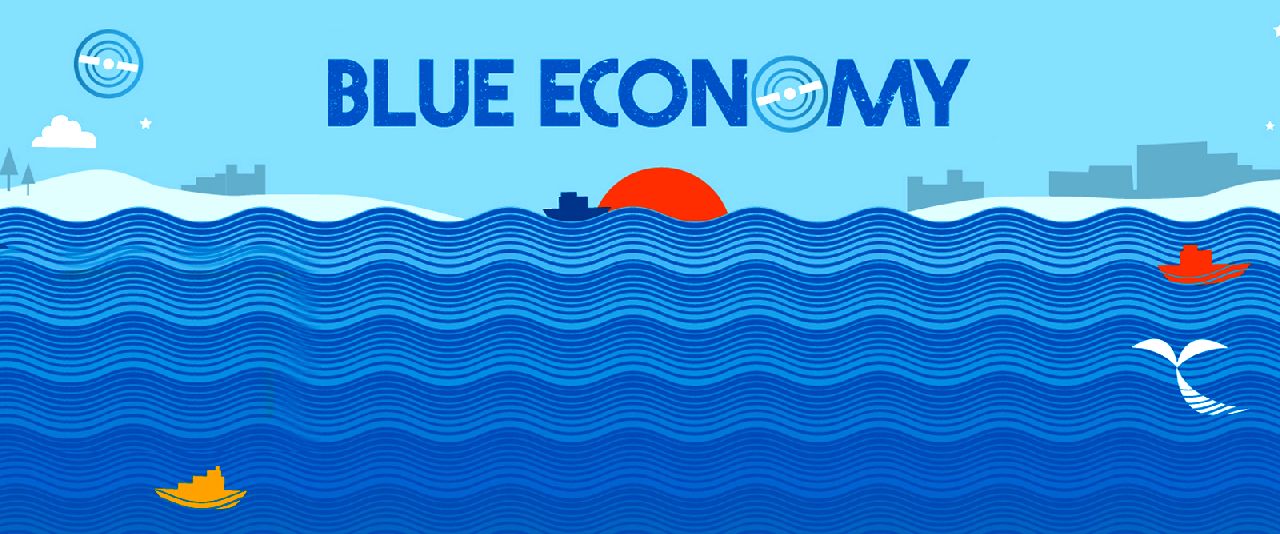
REPORT -
The Blue Economy concept is emerging as a new narrative on productive and sustainable engagement with the vast development opportunities that oceanic resources offer. The important sectors of Blue Economy are fisheries, sea-minerals including oil and gas, ports and shipping, marine tourism, marine biotechnology, deep-sea mining, and transport and logistics.
It is believed that by undertaking Blue Economy initiative countries would be able to achieve high economic growth and maintain healthy balance between resource use and its
renewability. However, there are few attempts to estimate the gains of Blue Economy. This assumes importance in the light of the fact that the world faces the challenge of restoring a healthy balance between the ambition of high economic growth and the goal of environmental sustainability.
Looking to 2030, many ocean-based industries have the potential to outperform the growth of the global economy as a whole, both in terms of value added and employment. Between 2010 and 2030 on a “business-as-usual” basis, the ocean economy could more than double its contribution to global value added, reaching over USD 3 trillion. Particularly strong growth is expected in marine aquaculture,
offshore wind energy,
fish processing, and
shipbuilding and
repair. Ocean industries also have the potential to make an important contribution to employment growth. In 2030, they are anticipated to employ approximately 40 million full-time equivalent jobs in the business as-usual scenario. The fastest growth in jobs is expected to occur in offshore wind
energy, marine
aquaculture, fish processing and port activities.
The OECD Directorate for Science, Technology and Innovation has launched an original programme of work on the ocean economy and innovation with the objective to provide decision-makers with an improved toolbox to foster innovation for harnessing the ocean economy’s potential in a responsible and sustainable way. This will include new evidence-based information to decision-makers to improve their innovation policy mix for sustainable ocean management.

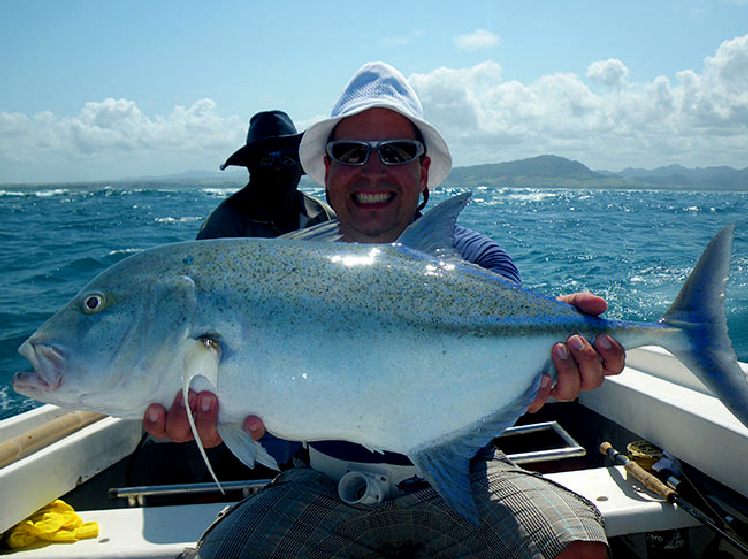
FISHING
& SPORT - Mauritius aims at becoming a centre of excellence for ocean knowledge within the next 15 years, both as a support industry and an industry in its own right. The
University of Mauritius that has set up a Faculty of Ocean Sciences is currently looking to secure partnerships with international universities in view of developing the course contents of a variety of proposed ocean-related studies.
In-lagoon aquaculture has also emerged recently and 15 sites are available for marine
aquaculture. Farming of high-value and niche products such as seaweed, oyster and oyster pearl, crabs, sea-urchins and other shellfish are being encouraged.
This will be undertaken through a series of expert workshops, research on new OECD indicators, and innovation policy discussions with ocean-related communities around the world (ministries, agencies, academia, foundations, NGOs and the private sector). The activities are organised around four major themes:
* Exploring the role of scientific advances and enabling technologies in driving
innovation in the
ocean economy.
* Investigating emerging patterns and platforms of collaboration in innovation among different marine and maritime actors in ocean R&D around the world.
* Extending the frontiers of the use of economic valuation, analysis and tools further into areas of ocean-related activities.
* Analysing the role of the public sector and the impacts of policy mix in boosting innovation in the ocean economics.
LINKS
& REFERENCE
http://fca.be/en/article/port-ostend-home-port-blue-growth
http://www.bbc.co.uk/programmes/p02st6pv
http://www.moss.org.au/How-does-the-Circular-Economy-differ-to-the-Blue-Economy
http://www.oecd.org/futures/oceaneconomy.htm
http://www.investmauritius.com/investment-opportunities/ocean-economy.aspx
https://oceanservice.noaa.gov/facts/oceaneconomy.html
https://www.moore.org/
https://www.eiuperspectives.economist.com/sustainability/blue-economy
https://www.oceanprosperityroadmap.org/
http://www.theblueeconomy.org/the-book.html
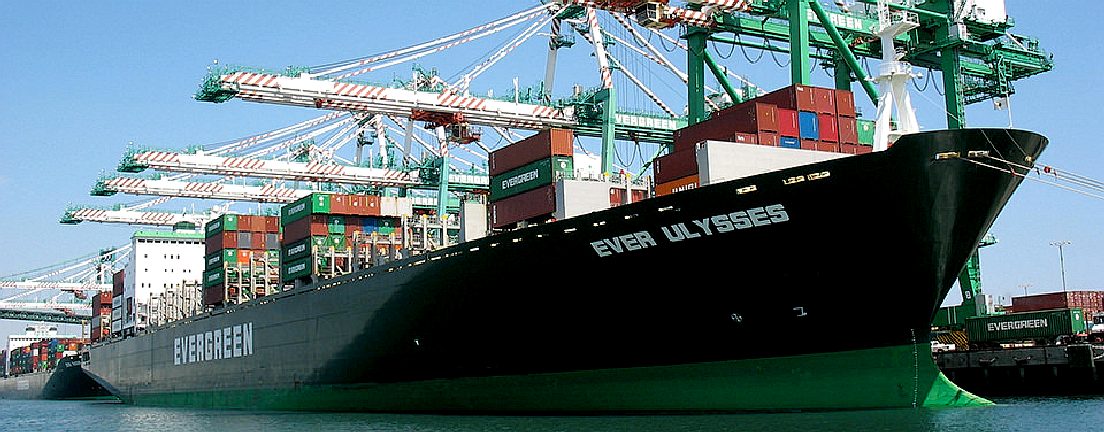
This
website is provided on a free basis as a public information
service. Copyright © Cleaner
Oceans Foundation Ltd (COFL) (Company No: 4674774)
August 2017 - June 2025. Solar
Studios, BN271RF, United Kingdom.
COFL
is a charity without share capital.
|









